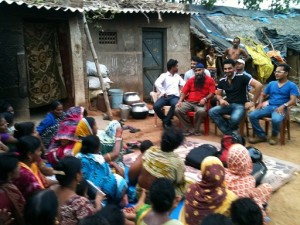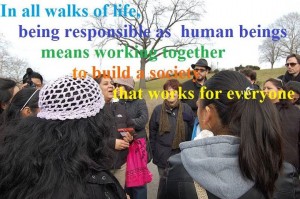Since time immemorial, various religious traditions have sought to offer humanity meaning, truth, justice, fruitfulness, well-being, love, and peace. By means of stories, rituals, common beliefs, personal and social commitments, and deep openness to divine help; many religions have held societies together and devotedly passed from one generation to the next life-giving experiences, teachings, and virtues. Religions have stirred humanity’s conscience with vibrant art, dance, music, literature, personal example and sacrifice, and much more. Additionally, spiritually inspired people have established remarkable centers of learning and health. Moreover, inspired people have energetically helped to largely remove immense evils that have plagued our world, such as slavery. To achieve these accomplishments, religious people and others have had to question themselves, explore new directions, and work respectfully with those of different beliefs.
We know too that religion and religious fervor have sometimes failed humanity. Even within families and among friends, we see needless divisions and strife emerging from religious disputes. On a larger scale in our history, we see religious groups justifying slavery and other grave injustices, burning heretics and witches, persecuting non-believers, suppressing scientific inquiry, sabotaging peacemaking efforts, and blessing and fueling egregious wars. When looking at these evils, a pattern emerges: the true nature of an evil is being obscured by the unhealthy or deceptive use of religious language and ideas.
With this history in mind, all religious groups would do well to realize that much good is accomplished outside the context of their religion, that God works 24/7 with all people in all places, and that much good can be accomplished by working closely together with those of different beliefs, including agnostics and atheists. Moreover, within our own religion, we need to learn how to better see through the obscurations of those who appear as “guardians of truth,” who have little interest in peace, and who push religious language and ideas in such a way as to obstruct peacemaking efforts between diverse peoples.Today, we, people of my country and of many countries, have been greatly hindered, by cultural and religious obscurities, in our efforts to rid ourselves of war. As a result, we, people throughout the world, often feel that war is a necessity and that the prospects for a just and lasting peace are a far-off dream.
In 1935, in a similarly hopeless and miserable situation, 12 step programs began to offer hope and help to desperate alcoholic persons. Their approach, I believe, holds hope for us all.
These twelve-step programs were founded upon a set of guiding principles whose purpose is to bring recovery from an addiction, a compulsion, or a behavioral problem. Aha! Recovery! Like world peace!
12 step programs began with Alcoholics Anonymous (AA). Through AA, alcoholic persons began working together, supporting one another, and leading one another to an ongoing recovery from alcoholism and to the reestablishment of sobriety in their lives. AA’s success in helping alcoholics led to the formation of similar groups: Cocaine Anonymous, Clutterers Anonymous, Co-dependents Anonymous, Debtors Anonymous, Gamblers Anonymous, Overeaters Anonymous, Workaholics Anonymous, etc. There’s even a philosophically related group called Peace Anonymous.
Here are the 12 steps in their general form as found at 12step.org with added thoughts bracketed to highlight peace applications.
- We admitted we were powerless over our addiction [to enmity, violence, injustice, and war] – that our lives [and our world] had become unmanageable
- Came to believe that a Power greater than ourselves could restore us to sanity [and peace]
- Made a decision to turn our will and our lives over to the care of God as we understood God
- Made a searching and fearless moral inventory of ourselves, [our groups, and our country]
- Admitted to God, to ourselves, and to another human being[s] the exact nature of our wrongs
- Were entirely ready to have God remove all these defects of character
- Humbly asked God to remove our shortcomings
- Made a list of all persons, [groups, and countries] we had harmed, and became willing to make amends to them all
- Made direct amends to such people wherever possible, except when to do so would injure them or others
- Continued to take personal inventory and when we were wrong promptly admitted it
- Sought through prayer and meditation to improve our conscious contact with God as we understood God, praying only for knowledge of God’s will for us and the power to carry that out
- Having had a spiritual awakening as the result of these steps, we tried to carry this message to other addicts, and to practice these principles in all our affairs
Notice, surprisingly, that these 12 steps do not include an admonition against giving in to our addictions. There’s no step, for example, for the alcoholic person, to not drink alcohol. Why? Because these steps address our needs on a different level, a spiritual level that brings us to the roots of our addictions and guides us toward a “spiritual awakening” in harmony with each of our own understanding of God, that “power greater than ourselves” (in the original AA version) active with each person.
Thus, AA and other 12 step groups firmly rely on our “Higher Power” while working together to achieve recovery and sobriety. Moreover, persons engaged in 12 step programs rely on that “power greater than ourselves” to guide each person in becoming spiritually awakened. However, 12 step members don’t further specify God’s name with other cherished names exclusive to particular religions when meeting together. Why is that? What good are these groups achieving by limiting themselves to these very plain phrases to describe God such as “God as we understand God” or “Higher Power?”
This approach is similar to a family who has difficulties sharing well about religious topics, and whose members decide to limit in some way how they discuss religious topics. Why this decision? Because the family has some understanding of their own personal limitations and of the limitations of their own belief systems, which at times jeopardize the effective sharing of respect, love, and support that is needed and called for within the family. Like this family, our human family and our world has difficulty sharing well about religious topics.
Imagine for a moment a meeting of weak persons – we’re all weak – who identify themselves as Baptist Christian, agnostic, Jewish, Shiite Muslim, Catholic Christian, Sunni Muslim, atheist, Taoist, Mormon, … who, while being who they are, are all effectively working together, all energetically nurturing each other and encouraging each person to remain on their chosen path of spiritual awakening empowered by their Higher Power. Imagine such a group, that does not allow itself to be side-tracked with discussions of particular religious differences, but rather is focused on the needs of the moment, for example, the needs of the newcomers who have just arrived and who need huge help in getting through the next few hours and next few days in coping with their addictions. I am fortunate, that a friend used to bring me to AA meetings, because I have seen this kind of meeting in action over and over again.
Imagine another similar meeting of needy persons, who do allow themselves to get involved in faith-specific theological discussions and friendly debates, and who at times promote their own specific religious beliefs when other needs are pressing. How will the needy newcomers fare in this group? Will the group’s work get done?
Those hoping and working for peace can learn a great deal from AA meetings. Everybody needs to be humble. Everyone needs to regularly admit that he or she has serious problems. As peacemakers, we need to spend time getting to know each other. In our interactions together, we need to be energetically centered on our common problem. And, like AA, we need not harp on each other’s failures, but rather seek understanding, forgiveness, support, and recovery.
12 step groups are fellowships of people who share their experiences, strengths, and hopes to continually overcome their common problem. The only requirement for membership is the desire for this recovery. Equally so, God doesn’t want war, and most people don’t want war either. But, in order to accomplish this, we too need to be in fellowship and to continually be centering ourselves on overcoming our unhealthy acceptance of enmity, injustice, violence, and war into our lives. As peacemakers, this is our common problem. Such a pursuit, guided by practical and specific steps, can lead each of us to a growing spiritual awakening where we will become better agnostics, atheists, Buddhists, Christians, Hindus, Jews, Muslims, Taoists, … and where we will become better peacemakers and better human beings.Through the use of many elements in this 12 step approach, we can further our hopes to end the wars that are now destroying people’s lives and end war before it destroys humanity. So let us be “fearless” in recognizing our “addiction.” Let’s work on our “common problem” with each other and with “God as we understand God.” And let’s step by step bring our world a fresh and enduring “sobriety,” “fellowship,” and peace.
| My point in all of this is not that we should never humbly and mutually share the treasures of our particular faiths, but that we, while involved in the work of peacemaking with those of different beliefs, have much to learn from the approach of the 12 step programs, and that whenever we do humbly and mutually share our faith treasures that we do it in a way that in no way belittles others or jeopardizes our needed common work and calling toward real peace with others. Finally, I would like to gratefully acknowledge that I have learned so much and been enriched so much by listening well to those of other beliefs and faiths, including the wisdom I have gained from listening to agnostics and atheists. I hope too that whenever I do share the treasures of my own faith, that I do it in a way that only positively benefits others and that my sharing contributes well to our mutual healing and reconciliation.
Peace folks! |


